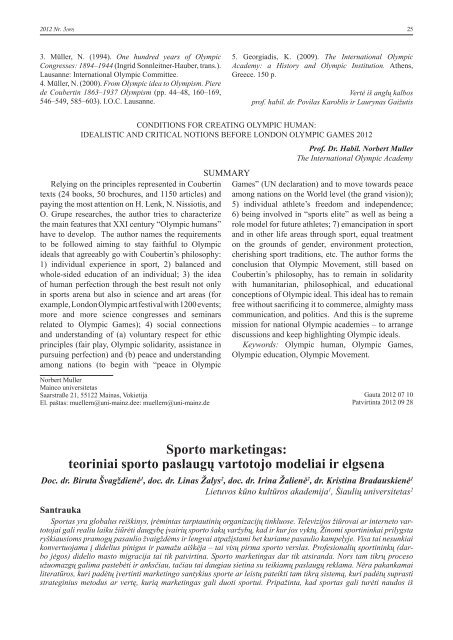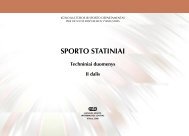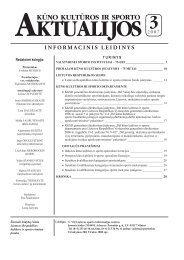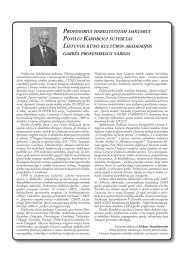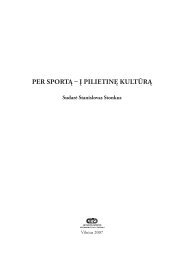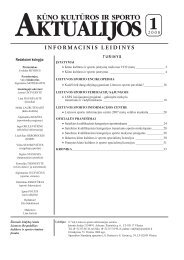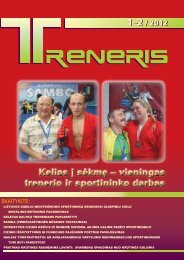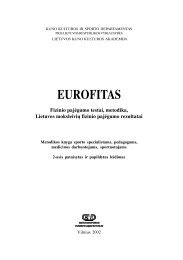Nr. 3 - Lietuvos sporto informacijos centras
Nr. 3 - Lietuvos sporto informacijos centras
Nr. 3 - Lietuvos sporto informacijos centras
You also want an ePaper? Increase the reach of your titles
YUMPU automatically turns print PDFs into web optimized ePapers that Google loves.
2012 <strong>Nr</strong>. 3(69)<br />
25<br />
3. Müller, N. (1994). One hundred years of Olympic<br />
Congresses: 1894–1944 (Ingrid Sonnleitner-Hauber, trans.).<br />
Lausanne: International Olympic Committee.<br />
4. Müller, N. (2000). From Olympic idea to Olympism. Piere<br />
de Coubertin 1863–1937 Olympism (pp. 44–48, 160–169,<br />
546–549, 585–603). I.O.C. Lausanne.<br />
5. Georgiadis, K. (2009). The International Olympic<br />
Academy: a History and Olympic Institution. Athens,<br />
Greece. 150 p.<br />
Vertė iš anglų kalbos<br />
prof. habil. dr. Povilas Karoblis ir Laurynas Gaižutis<br />
Conditions for creating Olympic human:<br />
idealistic and critical notions before London Olympic Games 2012<br />
Relying on the principles represented in Coubertin<br />
texts (24 books, 50 brochures, and 1150 articles) and<br />
paying the most attention on H. Lenk, N. Nissiotis, and<br />
O. Grupe researches, the author tries to characterize<br />
the main features that XXI century “Olympic humans”<br />
have to develop. The author names the requirements<br />
to be followed aiming to stay faithful to Olympic<br />
ideals that agreeably go with Coubertin’s philosophy:<br />
1) individual experience in sport, 2) balanced and<br />
whole-sided education of an individual; 3) the idea<br />
of human perfection through the best result not only<br />
in sports arena but also in science and art areas (for<br />
example, London Olympic art festival with 1200 events;<br />
more and more science congresses and seminars<br />
related to Olympic Games); 4) social connections<br />
and understanding of (a) voluntary respect for ethic<br />
principles (fair play, Olympic solidarity, assistance in<br />
pursuing perfection) and (b) peace and understanding<br />
among nations (to begin with “peace in Olympic<br />
Summary<br />
Prof. Dr. Habil. Norbert Muller<br />
The International Olympic Academy<br />
Games” (UN declaration) and to move towards peace<br />
among nations on the World level (the grand vision));<br />
5) individual athlete’s freedom and independence;<br />
6) being involved in “sports elite” as well as being a<br />
role model for future athletes; 7) emancipation in sport<br />
and in other life areas through sport, equal treatment<br />
on the grounds of gender, environment protection,<br />
cherishing sport traditions, etc. The author forms the<br />
conclusion that Olympic Movement, still based on<br />
Coubertin’s philosophy, has to remain in solidarity<br />
with humanitarian, philosophical, and educational<br />
conceptions of Olympic ideal. This ideal has to remain<br />
free without sacrificing it to commerce, almighty mass<br />
communication, and politics. And this is the supreme<br />
mission for national Olympic academies – to arrange<br />
discussions and keep highlighting Olympic ideals.<br />
Keywords: Olympic human, Olympic Games,<br />
Olympic education, Olympic Movement.<br />
Norbert Muller<br />
Mainco universitetas<br />
Saarstraße 21, 55122 Mainas, Vokietija<br />
El. paštas: muellern@uni-mainz.dee: muellern@uni-mainz.de<br />
Gauta 2012 07 10<br />
Patvirtinta 2012 09 28<br />
Sporto marketingas:<br />
teoriniai <strong>sporto</strong> paslaugų vartotojo modeliai ir elgsena<br />
Doc. dr. Biruta Švagždienė 1 , doc. dr. Linas Žalys 2 , doc. dr. Irina Žalienė 2 , dr. Kristina Bradauskienė 1<br />
<strong>Lietuvos</strong> kūno kultūros akademija 1 , Šiaulių universitetas 2<br />
Santrauka<br />
Sportas yra globalus reiškinys, įrėmintas tarptautinių organizacijų tinkluose. Televizijos žiūrovai ar interneto vartotojai<br />
gali realiu laiku žiūrėti daugybę įvairių <strong>sporto</strong> šakų varžybų, kad ir kur jos vyktų. Žinomi sportininkai prilygsta<br />
ryškiausioms pramogų pasaulio žvaigždėms ir lengvai atpažįstami bet kuriame pasaulio kampelyje. Visa tai nesunkiai<br />
konvertuojama į didelius pinigus ir pamažu aiškėja – tai visų pirma <strong>sporto</strong> verslas. Profesionalių sportininkų (darbo<br />
jėgos) didelio masto migracija tai tik patvirtina. Sporto marketingas dar tik atsiranda. Nors tam tikrų proceso<br />
užuomazgų galima pastebėti ir anksčiau, tačiau tai daugiau sietina su teikiamų paslaugų reklama. Nėra pakankamai<br />
literatūros, kuri padėtų įvertinti marketingo santykius sporte ar leistų pateikti tam tikrą sistemą, kuri padėtų suprasti<br />
strateginius metodus ar vertę, kurią marketingas gali duoti sportui. Pripažinta, kad sportas gali turėti naudos iš


